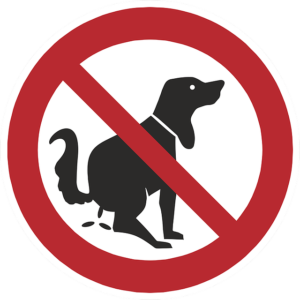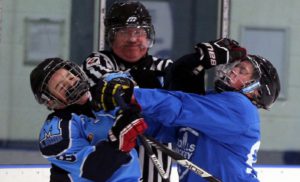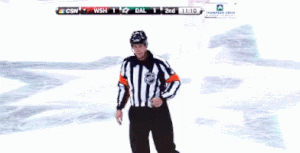You may have heard in the last few weeks about an incident in the youth hockey world. It has gotten a fair amount of media attention, with good reason, and it highlights the sad fact that while most kids learn valuable life lessons in hockey, some kids – and sadly, their parents and coaches – completely ignore and reject those lessons.
In case you’re not aware of what I’m talking about, here’s the short version. Some youth hockey players from one team went into another team’s locker room when nobody was there, and proceeded to urinate and defecate in the players’ equipment bags.
Yeah. I know. When I first heard about it, I thought there was no way this could be true, that the real story had to have been distorted and revised, like in a game of Telephone, until what people were saying bore no resemblance to what had actually happened.
As it turns out, though, it really did happen. There are some more details, of course, and we’ll get to those in a minute. I have to say, I’m not thrilled with the subject of today’s post, but it’s one that is stuck in my head so I’m just going to write about it and hopefully get it out of my system.
Dirty Deeds
OK, so this is the story. A group of six kids from a 2005 AAA team on Long Island, N.Y. went into the locker room of a 2003 team from a  different organization. From all the information I have been able to piece together, at least one of the 2005 players, but possibly all six (the state governing body has not released specifics), then used the 2003 players’ equipment bags as toilets.
different organization. From all the information I have been able to piece together, at least one of the 2005 players, but possibly all six (the state governing body has not released specifics), then used the 2003 players’ equipment bags as toilets.
Beyond that, apparently the parents of these six players were aware of what the kids were doing and even encouraged it. There was purportedly some kind of tension that had built up between players on the two teams. Again, since the governing body hasn’t made public the details that they uncovered during their investigation, there are different accounts out there. It’s not clear if this tension started the same day of the incident or if it had been going on for a while. Likewise, some people have described it as arguing or trash talking back and forth between the two teams, while others have said the 2003 team was trying to intimidate members of the 2005 team.
Reading Between the Lines
I don’t know about you, but I’m not buying the argument that the 2005 team was being bullied. If kids are being bullied, it seems highly unlikely that they would respond in a way that pretty much guarantees a whole new level of anger from the alleged bullies.
Think about it. If you were on a team and a bunch of kids from another team – two years older, so presumably bigger – were bullying you and your teammates, would you really do something to increase their animosity? Especially knowing that you would be crossing paths with those same kids at rinks all season (and beyond)?
That doesn’t mean that there wasn’t something going on beforehand; there almost certainly was. In fact, some reports featured a quote,  allegedly from a parent of one of the six players, to the effect that the team needed to “make a statement” so the other team would “know who they’re dealing with.”
allegedly from a parent of one of the six players, to the effect that the team needed to “make a statement” so the other team would “know who they’re dealing with.”
If that quote is accurate, then it says to me that players from both teams were doing some trash talking, and then some players from the 2005 team decided to go into the other team’s locker room and drop deuces. Whether the parents encouraged the kids or simply didn’t stop them remains to be seen, and we may never know for sure.
Still, does it really matter? Even if the parents didn’t encourage them and are “only” guilty of not stepping in and keeping things from going the way they went, they showed horrifyingly poor judgment and a complete lack of decency. The apples didn’t fall far from the trees, I guess.
The Fallout
After conducting an investigation, the New York State Amateur Hockey Association (NYSAHA) suspended the six players from the 2005 team, as well as the head coaches for both teams. The suspensions last until March 31, 2020, and NYSAHA asked USA Hockey to carry the suspensions throughout all USA Hockey activities.
The coaches were suspended because there was no adult supervision in either locker room. It’s also interesting to note that  according to information online, the coach of the 2005 team had just returned this season after being suspended the previous two seasons for physically assaulting an official. Seriously.
according to information online, the coach of the 2005 team had just returned this season after being suspended the previous two seasons for physically assaulting an official. Seriously.
Both organizations involved (not just the specific teams, but the entire organizations) were put on probation until October 1, 2020. The rest of the 2005 team (aside from the suspended players and coach) can play the rest of the season, but are not eligible for the state tournament, and NYSAHA has asked USA Hockey to make the team ineligible for the national tournament as well.
Now What?
Whenever there’s a shocking incident like this one, we’re left to wonder about a lot of things. First and foremost is probably “What is wrong with people?” But there’s also the question of what to do about it. This is where I think NYSAHA has made a mistake.
I’m not talking about the punishments they doled out, necessarily. There’s not really enough information available to know if those are too harsh, too lenient, or just right. But that is exactly my point. Even though this story has been reported, and generated lots of discussion in online forums, NYSAHA has not made any public comments about it to my knowledge. A check of the NYSAHA website shows nothing about the incident or the subsequent investigation and punishments. The same goes for the organization of the six suspended players.
That’s not the right way to handle something like this, in my opinion. I get that the whole situation is a very bad look for the organization, but the truth is that not addressing it doesn’t make it go away. Assuming they don’t want to have this be what defines them, they would be better off using this as a catalyst for change. That might mean instituting a code of conduct for both players and parents – or if the organization already had one, actually enforcing it. Sure, that could involve some changes to staffing, perhaps starting with the coach that was (at best) negligent in this incident and had been suspended before for assaulting an official. It might even mean parting ways with additional players. Maybe the on-ice achievements would slip in the short term. But really, what is the alternative? To pretend like nothing happened, even though the story is out there? That only makes the organization look worse – not just now, but especially down the road.
As for NYSAHA, I think the same applies. They did the right thing in suspending the kids for the entire season. Why not tell people exactly what happened, so it sends a clear message that bad behavior will be addressed with serious consequences? I understand that there may be legal concerns about privacy, especially with the kids being minors, but the facts can be provided without revealing names. NYSAHA would be helping themselves and their members more by talking about this story as a cautionary tale, a deterrent that will reinforce expectations. In not doing so, they are missing an opportunity.
Stepping Off the Soapbox
Like I said at the beginning, this wasn’t the most enjoyable post I’ve ever written, but it was bugging me and I wanted to address it. What are your thoughts? Were you as shocked by this as I was? Do you think the punishments were appropriate, and how do you think the offending organization should deal with the whole situation? Please leave your comments and questions below!

It is strange that people end up doing this just because they want to make a statement or make a point. This is taking it too far and the perpetrators should be really dealt with. They have brought disgrace to their names. Trash talking is part of all sports but if there is any issue between two teams it should be settled on the field of play. That is how scores should be settled in sports but unfortunately, some people don’t think this way and involve themselves in things that disgrace themselves, their teams and their families.
Totally agree Manuel!
Yes, it is shocking, but somehow not surprising. Hockey is taken far too serious at the introductory levels. Often it’s parents who should be accepting much of the blame for incidents like this. It’s unfortunate, but all many hockey parents can think about is their kid making it in the NHL. Really, what are the odds of that ever happening anyway?
They see these dollar signs in front of their faces if their kid makes it to the big show. Look no further than how hockey parents behave in the stands. Fights, boorish behavior, attacking referees, attacking opposing players.
These parents have to get a life. They are ruining it for the kids who just want to have fun.
Hi Ray,
You’re right, some parents are way too focused on their kids making it to the NHL when the chances are insanely small. And the thing is, even if the kids have a good chance of making it, what’s the difference? How does that justify doing something like this?
Thanks for your comment – hope you’ll come back again.
Hello Jordan,
I have practiced sports from a young age also in clubs. Here in Argentina violence in sports is normal. I am very embarrassed. Everything you explain in your article is the same to me.
I never did a sport for money, I did it because I really like playing it. Everything money touches is corrupted, it’s a shame. Thank you very much for sharing your article.
Thanks for commenting Claudio!
It is indeed shocking that players would disrespect other players’ equipment bags, and more so, with the knowledge of their parents. For juniors to take this action against older peers suggests that they had probably been assured of protection or something like that. A suspended coach, manner-less kids all say one thing, that disrespect was tolerated or simple life manners were not important to the players. Maybe the suspension and some serious counselling would shake them up a little. As for NYSAHA, acknowledging that there was an incident and that discipline was not observed by its members is the first step to making things better.
Hi Carol,
Great point, I think that along with the suspensions, maybe some counseling and/or community service should be a requirement before the players and coach are allowed to come back.
I did read about the situation and I do not one bit believe that the kids were being bullied. It would be different if they were from the same age group or maybe a year apart but two years? Those kids have to be bigger, how are the younger kids going to do something like this if they were scared of the bullies. Great read!
Yeah, that part combined with the comment from a parent made me skeptical too. Thanks for your comment Tony.